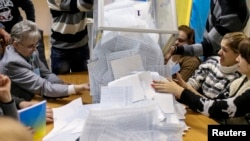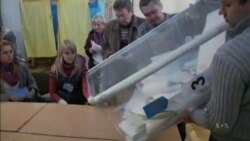President Barack Obama has congratulated the people of Ukraine on ‘holding successful parliamentary elections’ Sunday, as a partial vote count shows pro-Europe forces decisively ahead in the poll.
Noting a “challenging security environment” created by continued fighting between government and pro-Russia separatist forces in the country’s east, Obama lauded the voting as “orderly and peaceful,” and “largely in line with international standards,” according to a statement issued by the White House Monday.
With “Russian authorities occupying Crimea and Russian-backed separatists in parts of eastern Ukraine [preventing] many Ukrainian citizens from exercising their democratic rights,” Obama called on Moscow to allow voters in the restive Donetsk and Luhansk to freely hold elections, scheduled by Kyiv for December 7.
Apparently in response to reports that rebels plan to hold their own polls on November 2, Obama said that the “United States will not recognize any election held in separatist-held areas that does not comport with Ukrainian law.”
Calling Sunday’s election an “important milestone in Ukraine’s democratic development,” Obama also pledged continued U.S. support.
“The United States also will continue to support Ukraine’s sovereignty and territorial integrity as it works toward a peaceful resolution of the conflict in the east and a return of Crimea, and will stand with its people as they seek to build a more secure, prosperous, and democratic future,” said Obama.
Pro-Europe parties leading
With more than 65 percent of the votes counted from Sunday's poll, pro-Europe parties are emerging as clear leaders in the race.
Ukraine's Central Election Commission reports Prime Minister Arseniy Yatsenyuk's Popular Front is in first place, with nearly 22 percent of the vote, followed closely by the electoral bloc headed by President Petro Poroshenko, with 21 percent of the vote.
Despite leading rival parties, Poroshenko and Yatsenyuk both have vigorously campaigned for democratic and economic reforms hoping to forge a way for Ukraine’s eventual membership in the European Union.
The Self Help Party of western Ukraine, a likely ruling coalition partner, was in third place with about 11 percent, with the Opposition Bloc made up mostly of members of ousted Moscow-backed president Viktor Yanukovych in fourth, with nearly 10 percent.
Three other parties, with mostly pro-Western platforms, also cleared the mandatory five-percent threshold needed for parliamentary representation. The Communist Party, a fixture since Ukraine’s independence in 1991, failed to pass the hurdle.
Russia reacts
Russian Foreign Minister Sergei Lavrov said on Monday he hoped Ukraine would form a “constructive” government and work towards easing tensions within the country as well as in its ties with Moscow, Itar-Tass news agency reported.
“We hope that the election ... will allow for the swift creation of a government that will be constructive, will not seek to continue escalating confrontational tendencies in society, [in ties] with Russia,” the news agency quoted Lavrov as saying.
Watch video report from Zlatica Hoke:
Kyiv and a host of Western governments blame Moscow for backing rebels in Ukraine’s in a conflict that has killed more than 3,700 people and brought the Ukrainian economy to the brink of collapse.
Russia has rejected the charges, with President Vladimir Putin accusing the West of backing an "coup d'etat" that toppled the Yanukovych government.
International observers gave Sunday's parliamentary election in Ukraine a clean bill of health on Monday, saying it had offered real choice and largely upheld democratic commitments.
“The elections marked an important step in Ukraine's aspirations to consolidate democratic elections in line with its international commitments,” said Kent Harstedt, Special Coordinator for the Organization for Security and Cooperation in Europe, a security and rights watchdog.
Poland moves troops to border
Poland announced Monday that it plans to triple the military presence on its southeast border in response to the ongoing rebellion in neighboring Ukraine.
The country's defense minister told the Associated Press that the number of troops at three bases will increase in the coming years, potentially affecting thousands of soldiers.
The realignment will gradually move the concentration of armed forces from Poland's western border.
Tensions remain high in Ukraine, where Warsaw supports Ukraine's government.
At a NATO summit in September, Poland was among several member states that offered to host staff and supplies from the military alliance in its increased military response to the conflict.
Crimea right violations alleged
Meanwhile, the Council of Europe issued a report Monday on human rights abuses in Crimea, the Black Sea peninsula Russia annexed from Ukraine in March. The report details specific cases, including that of Reshat Ametov, an ethnic Tatar in his 30s who was found dead in March with signs of torture, and those of three civil society activists who are missing.
The Council of Europe said Monday that all cases of serious of human rights violations that have occurred in Crimea since February 2014, including recent abductions, must be effectively investigated and those responsible held accountable.
The human rights watchdog also said that "urgent steps" must be taken to ensure minority rights and security on the peninsula, as well media freedom and the safety of journalists.
Some information for this story came from Reuters.







